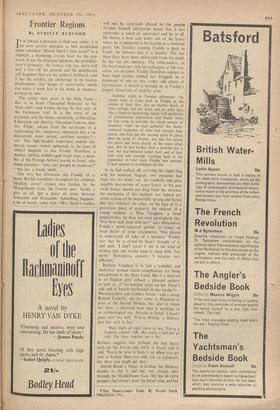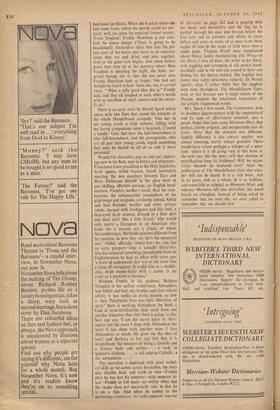Frontier Regions
By SYBILLE BEDFORD
Ii is always a pleasure to find new talent; it is an even greater pleasure to find established talent enriched. Muriel Spark's new novel* is a triumph, a thumping. joyous blow for the pro- novel. It has the delicious lightness, the prestidigi- tator's virtuosity, the fantasy (oh, yes, we're still half a foot off the ground and the unexpected still happens) that are the author's hallmark; and it has the solidity, the anchorage in the human predicament, that bonus of universality which can make a work last in the mind, in memory, perhaps in time.
The action takes place in the Holy Land— that is, in Israel ('Occupied Palestine' to the Arab side)—and Jordan during the first year of the Eichmann trial. It is the story of an escapade, and the theme, essentially, is liberation. Liberation and identity; liberation from an iden- tity. Flight, release from the accretions of a conforming life, temporary expansion into a re- discovered. more potent, carefree—careless?— self. This light-headed experience (which ulti- mately causes violent upheavals in the Jives of others) happens to one Freddy Hamilton, a modest, dutiful, middle-aged single man, a mem- ber of the Foreign Service posted in Israel, who shuns extremes—'why can't people be moderate?' --but has a lovely smile.
One very hot afternoon, this Freddy 'of so many British consulates throughout his subdued, obedient career' crosses into Jordan by the Mandelbaum Gate, the frontier post, 'hardly a gate at all, but a piece of street between Jerusalem and Jerusalem.' Something happens; a set of words, some trick—Mrs. Spark's readers
will not be surprised—played by the psyche (Freddy himself afterwards insists that it was sunstroke, a touch of sunstroke) and he is off. He leaves a note and walks out of the house where he is supposed to be staying as a weekend guest. On Tuesday evening Freddy is ,back in Israel : he believes that it is Sunday, the last three days have been obliterated from his mind, he has lost his memory. The ambassadors, as . the hotel manager calls his colleagues at the con- sulate. are alarmed; Freddy Hamilton appears to have been neither robbed nor drugged; he is possessed of one or two rather odd pieces of information. A doctor is brought in, to Freddy's disgust. Questions of security arise.
Saturday night to Tuesday afternoon : the events were to come back to Freddy in the course of time; first, like an electric shock of fatal voltage, but not fatal, and so, after that, like a cloud of unknowing, heavy with molecules of accumulated impressions and finally when he had come to consider the whole mosaic of evidence, when he had gathered the many- coloured fragments of what had actually hap- pened, and had put the missing parts in place, then he came to discern, too late for action but more and more clearly as the years sifted past, that he had neither been a monster nor a fool, but had beha■Td rather well, and at least with style and courage. Looking back at the experience in later years Freddy was amazed. It had seemed to transfigure his life. . . .
As he had walked off, carrying the zipper-bag with his weekend luggage, two purposes had leapt into his mind; one, the symbolic and quite tangible destruction of some fetters to his past (wild horses should not drag from the reviewer the mechanics of this incident, nor indeed any closer outline of the beautifully sprung and baited plot that follows); the other, on the face of it, a gratuitous piece of quixotry, the succour of a young woman, a Miss Vaughan, a hotel acquaintance, he does not even particularly like. 'You 'have had sleep with her?' asks Alexandros, Freddy's newly-acquired partner in crime, an Arab dealer of large attainments. 'One desires to understand all sides of a business.' Freddy says that he is afraid he hasn't thought of it, and adds, 'I don't know if she is the kind of woman that one would want to sleep with. Too nervy.' Alexandros answers, 'I imagine very different.'
Barbara Vaughan is in fact a complex and analytical woman whose complexities are being precipitated in the Holy Land. She is a mistress at an English girls' school, a pleasant spinster to look at, of fox-hunting stock on -her father's side and of Jewish intellectual on her mother's---- Worcestershire and Golders Green—and a recent Roman Catholic; she has come to Palestine to pray at the Sacred Shrines, but also to rejoin her lover, a divorced man who is working on an archaeological site. Already in Israel, it hasn't gone over too well. 'You're British.' a Hebre,‘ don has said to her, 'Well, that's all right, more or less. You're a Catholic convert—OK. But you're a half-Jew as well. The three together arc a lot.'
Barbara suggests that perhaps she had better hush up the Jewish side while in Israel, and is told, 'You'd be wise to hush it up when you get over to Jordan. Here you only risk an argument, but there you might get shot.'
Jewish blood is illegal in Jordan, but Barbara decides to risk it and she, too, crosses over through the Mandelbaum Gate. She has an extra passport that doesn't show the Israeli visa, and her
S THE MANDELBAUM GATE. By Muriel Spark. (Macmillan, 25s.) baptismal certificate. When she is asked where she had come from, which the guards could see per- fectly well, she gives the required formal answer, `From England.' Freddy Hamilton is not satis- fied; he senses danger (`There is going 'to be bloodshed'); Alexandros takes him into the, pri- vate part of his house and there in an exquisite room they eat and drink and plot together. And so the great lark begins. And when before dawn they turn up at the nunnery where Miss Vaughan is spending the night, she finds, sur- prised though she is,. that she has never seen Freddy Hamilton look so happy, 'she had not thought he had it in him.' Soon she, too, is carried away. "What a jolly good idea this is," Freddy said, and they all laughed at each other's words with an overflow of relief, success and the moon- lit air.'
There is an early story by Muriel Spark which opens with two lines that sound the keynote of the whole Mandelbaum escapade. 'One day in my young youth at high summer, lolling with my lovely companions upon a haystack, I found a needle.' Only that here the light-heartedness is also full-heartedness, and the protagonists, who are all past their young youth, regain something that may be buried in all of us and is more perennial.
Wonderful characters pop in and out, appear- ing now in the flesh, now in letters and telegrams : Franciscan friars preaching at the Holy Sepulchre, Arab agents, veiled women, Israeli journalists enacting the non sequiturs between East and West, Eichmann himself in the glass dock in one chilling, effective passage, an English head- mistress, Freddy's mother's maid. And the com- panions, the indispensable accomplices of the pilgrimage and escapade, are lovely indeed, Abdul and Suzi Ramdez, brother and sister, private rebels, charged with intelligence and life; Suzi, a blue-eyed Arab woman, dressed in a blue shirt and dark skirt 'like a lithe Israeli,' who would only marry a European or an American who looks for a woman not a virgin, of whom Alexandros says, 'She holds opinions different from her parents; so here they say she's the unnatural one.' Abdul, officially twenty-five—he, too, has an extra passport—who is actually thirty-two, who has acquired something ineradicable from an Englishwoman he had an affair with years ago, 'a form of endowment that was at the same time a form of corruption. It undid him as a middle- class Arab enemy-hater with a career in the army or a position in business.'
Between Freddy, in his madness, Barbara Vaughan in her gallant compliance, Alexandros and Abdul and Suzi, this brother and Sister whose affinity is 'not unlike an erotic passion, so new to their Palestinian lives was their liberation of spirit,' there is working throughout the book a kind of cross-fertilisation, they catch from one another whatever élan vital there is going, so that Suzi can say, 'I am 'the secret lover of Alex- andros but the more I sleep with Alexandros the more I can sleep with another man. I love Alexandros so much. He gives me the idea of love,' and Barbara at last can feel that it is insignificant 'the business of being a Gentile and a Jewess, both and neither . . . a wolf in spinster's clothing . . . a self-judging Catholic, a shy adventuress. . .
This narrative is deployed with great 'techni- cal skill; as we career across Jerusalem, the story also shuttles back and forth in time—Freddy after he has lost his memory—with memory in- tact—Freddy in full spate—so swiftly often that the reader does not necessarily take in that he is on it ride. And when he comes to the uproarious revelation, the bold apparent reversal of character on page 262 and is gasping with the shock and incredulity and the fun, he is pushed through the door and thrown before the fact now and its portents and effects in years before and years to come all at once from three angles of time in the scope of little more than a single page. Virginia Woolf once complained about Henry James manipulating The Wings of the Dope; it was all done, she wrote in her diary, with juggling and arranging of silk pocket hand- kerchiefs, and in the end one ceased to have any feeling for the figures behind. She implied that James was using cleverness vulgarly. In Muriel Spark's case, I rather think that the jugglery with time throughout The Mandelbaum Gate, even or just because one is made aware of the illusion, deepens the emotional impression of the artfully fragmented events.
Mrs. Spark's first novel, The Comforters, with its deadpan jiggery-pokery with the supernatural and its tone of affectionate mischief, was a peach. Some time later came Memento Mori, that perfect, utterly original, and unrepeatable tour de force. After that the mixture was different, slightly different; it has always quality, was always amusing, nearly always graceful. There would have arisen perhaps a whisper of a ques- tion: where is it all going—not in this book or the next one, but the next—will that element of mystification keep its freshness? Will the eccen- tricity become an insulated turn? After the publication of The Mandelbaum Gate that whis- per will not be heard. It is a rich book; rich in its parts, rich as a whole. It is as brilliant, and essentially as original, as Memento Mori, and whereas Memento left one shrivelled, this novel leaves an afterglow. Instead of being asked to remember that we must die, we were asked to remember that we should live.







































 Previous page
Previous page